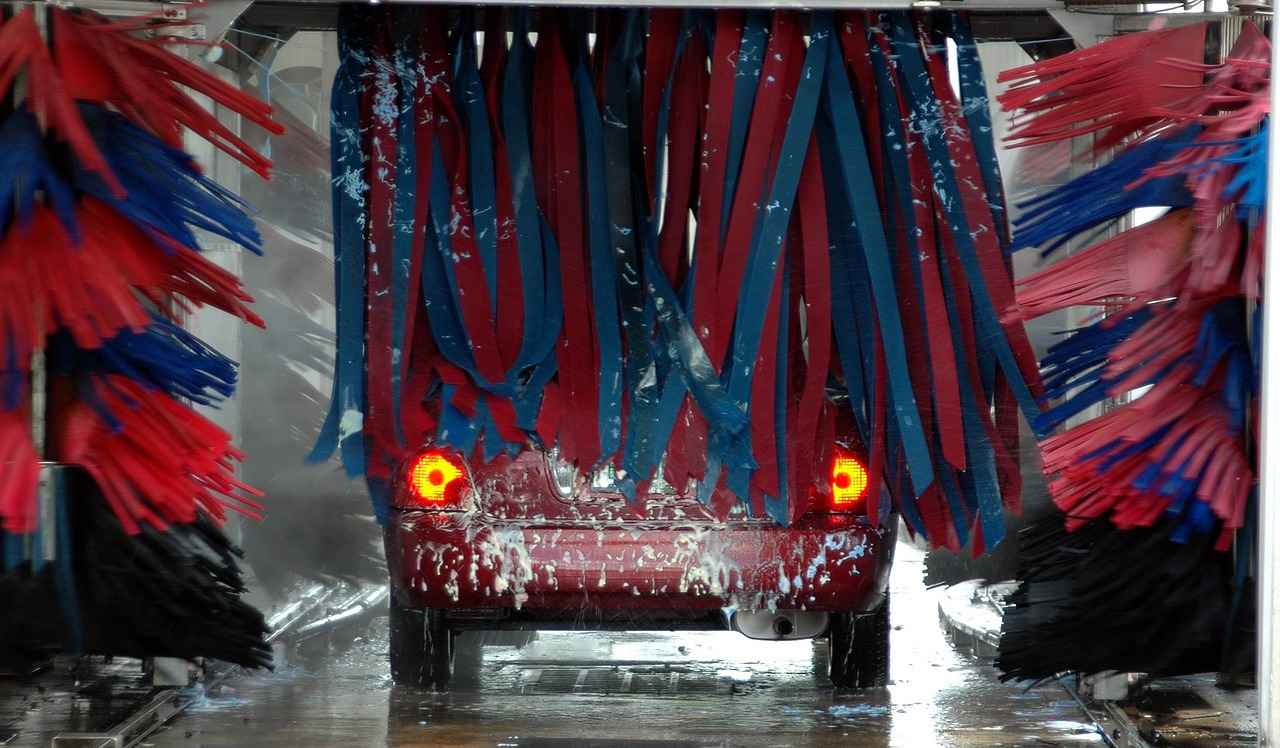This article provides practical strategies and insights to help you effectively prevent spider infestations in your vehicle, ensuring a more comfortable driving experience and maintaining your car’s cleanliness. By understanding what attracts spiders and implementing effective cleaning and preventive measures, you can keep your vehicle spider-free.
To effectively combat spider infestations, it is essential to recognize the factors that draw these pests into your vehicle. Common attractants include:
- Food remnants: Crumbs and leftovers can lure spiders as they attract other insects.
- Moisture: Spiders are often found in damp areas, so any leaks or moisture in your car can be an invitation.
- Dark, secluded spaces: Areas such as under seats or in the trunk can provide spiders with a perfect hiding spot.
Maintaining regular cleaning habits is crucial in preventing spider infestations. Here are some effective strategies:
Vacuuming your car’s interior regularly is vital for removing food particles and spider webs, creating an uninviting environment for these pests. Focus particularly on:
- Under seats
- In crevices where debris tends to accumulate
A handheld vacuum is particularly effective for reaching tight spots in your car. Its portability allows for easy access to areas that larger vacuums might miss, enhancing your cleaning routine.
Aim to vacuum your car at least once a month, or more frequently if you often eat or transport items in your vehicle. This proactive approach minimizes spider attraction.
Using cleaning wipes or sprays on surfaces like the dashboard and door panels helps eliminate potential spider attractants. Regularly wiping down these areas keeps your car clean and less appealing to spiders.
Implementing preventive measures can significantly decrease the chances of spider infestations. Consider the following strategies:
Spiders prefer dark and secluded areas. Parking your car in well-lit locations can deter them from approaching your vehicle, making it less likely for them to take up residence.
Inspecting your vehicle for gaps and cracks is crucial. Sealing these openings prevents spiders from entering, creating a barrier that protects your car from potential infestations.
Natural repellents can be an effective way to deter spiders without using harsh chemicals. Here are some options:
Certain essential oils, such as peppermint and tea tree oil, are known to repel spiders. Diluting these oils in water and spraying them around your vehicle can help keep spiders at bay.
Creating a homemade spider spray using vinegar and water is an eco-friendly option. This mixture can be sprayed in areas where spiders are likely to enter, providing a natural deterrent.
If you encounter a severe spider infestation that you cannot manage on your own, it may be time to consult a pest control professional. Understanding when to seek help is crucial for effective resolution.
If you notice numerous webs, multiple spider sightings, or even egg sacs, these may be indications of a significant infestation that requires professional intervention to eliminate.
Professional pest control services have the expertise and tools necessary to effectively remove spiders and prevent future infestations. Their methods are often more efficient than DIY solutions, ensuring your vehicle remains spider-free.

What Attracts Spiders to Your Car?
Understanding the factors that draw spiders into your vehicle can help you address them effectively. By identifying the common attractants, you can implement strategies to keep these eight-legged intruders at bay. Below are some of the primary reasons why spiders might find your car appealing:
- Food Remnants: One of the most significant attractants for spiders is leftover food. Crumbs from snacks or meals can create a feast for smaller insects, which in turn attract spiders looking for a meal. Regular cleaning is essential to eliminate these food sources.
- Moisture: Spiders are often drawn to areas with high humidity. If your car has leaks or if you frequently leave windows open, moisture can accumulate, making your vehicle an inviting habitat for spiders and their prey.
- Dark, Secluded Spaces: Spiders prefer dark and quiet environments where they can build webs undisturbed. Areas like under the seats, in the glove compartment, or behind the dashboard can provide perfect hiding spots. Keeping your car organized and clutter-free can reduce these hiding places.
- Seasonal Changes: During certain times of the year, especially in spring and fall, spiders may seek shelter from changing weather conditions. If your car is parked near vegetation or in a garage, it could become a temporary refuge for these creatures.
- Nearby Vegetation: Parking your car near bushes, trees, or tall grass can increase the likelihood of spider encounters. These areas often harbor insects, which attract spiders. Consider parking your vehicle away from such environments when possible.
By recognizing these factors, you can take proactive measures to discourage spiders from making your car their home. Regular cleaning, eliminating moisture sources, and choosing parking spots wisely are all effective strategies to maintain a spider-free vehicle. Remember, keeping your car clean and organized not only enhances your driving experience but also contributes to your overall safety and comfort.
In conclusion, being aware of what attracts spiders to your car is the first step in prevention. By addressing these common issues, you can significantly reduce the risk of a spider infestation in your vehicle.

How to Keep Your Car Clean and Spider-Free?
Keeping your car clean is not just about aesthetics; it plays a crucial role in preventing unwanted spider infestations. Spiders are often attracted to vehicles due to food remnants, moisture, and dark areas where they can hide. By adopting regular cleaning habits, you can effectively deter these eight-legged intruders from making your car their home.
Establishing a routine cleaning schedule is essential in minimizing spider attraction. Here are some effective strategies:
- Vacuuming: Regularly vacuuming your car’s interior is one of the most effective ways to eliminate food particles and spider webs. Focus on areas such as under the seats, in the cup holders, and between the cushions where debris tends to accumulate.
- Wiping Surfaces: Use cleaning wipes or sprays to clean surfaces like the dashboard, door panels, and console. This not only removes potential spider attractants but also keeps your car looking fresh and inviting.
- Removing Clutter: Clutter provides spiders with hiding spots. Keep your car organized by removing unnecessary items and regularly checking for forgotten trash or food wrappers.
To maintain a spider-free environment, aim to vacuum your vehicle at least once a month. If you often eat or transport items in your car, consider increasing the frequency to bi-weekly or even weekly. This proactive approach significantly reduces the likelihood of attracting spiders.
A handheld vacuum can be particularly effective for reaching tight spots in your car. Its portability allows you to easily access areas that larger vacuums might miss, enhancing your overall cleaning routine. Additionally, consider using microfiber cloths for wiping surfaces, as they effectively capture dust and dirt without scratching your car’s interior.
In addition to regular cleaning, implementing preventive measures can further decrease the chances of spider infestations:
- Parking in Well-Lit Areas: Spiders are less likely to approach your vehicle if it is parked in a well-lit location. Choose parking spots that are illuminated, especially at night.
- Sealing Gaps and Cracks: Regularly inspect your vehicle for any gaps or cracks that could allow spiders to enter. Sealing these openings creates a barrier that protects your car from potential infestations.
Natural repellents can be an effective way to deter spiders without resorting to harsh chemicals. Here are a couple of options:
- Essential Oils: Certain essential oils, such as peppermint and tea tree oil, are known to repel spiders. Diluting these oils in water and spraying them around your vehicle can create an unwelcoming environment for these pests.
- Homemade Spider Spray: A simple mixture of vinegar and water can serve as an eco-friendly spider deterrent. Spray this solution in areas where spiders are likely to enter, such as door seals and trunk openings.
By combining regular cleaning habits with preventive measures and natural repellents, you can create a less inviting environment for spiders in your car. This not only enhances your driving experience but also helps maintain the overall cleanliness of your vehicle.
Regular Vacuuming
Maintaining a clean car is essential for both comfort and safety. One of the most effective ways to prevent spider infestations is through . This simple yet crucial task not only enhances the overall cleanliness of your vehicle but also creates an unwelcoming environment for spiders.
Vacuuming your car’s interior on a regular basis helps eliminate food particles, dust, and debris that can attract spiders. Spiders are often drawn to dark and cluttered spaces where they can hide and hunt for food. By keeping your car clean, you significantly reduce the chances of these pests making your vehicle their home.
- Under Seats: This area is notorious for collecting crumbs and debris. Make sure to thoroughly vacuum under each seat to remove any potential spider food sources.
- Crevices and Cup Holders: Small gaps and crevices can accumulate dirt and food remnants. Use a vacuum attachment to reach these tight spots.
- Floor Mats: Remove and vacuum your floor mats regularly. They can trap dirt and food particles that attract spiders.
When it comes to vacuuming your car, the right equipment can make a significant difference. A handheld vacuum is particularly effective for reaching tight spots and is portable enough for easy use. Look for models with strong suction and various attachments to tackle different surfaces.
Aim to vacuum your car at least once a month. However, if you frequently eat or transport items in your vehicle, consider vacuuming more often. This proactive approach not only minimizes spider attraction but also maintains a cleaner and more pleasant driving environment.
In addition to vacuuming, consider incorporating these cleaning habits into your routine:
- Wipe Down Surfaces: Use cleaning wipes or sprays on surfaces like the dashboard and door panels to eliminate potential spider attractants.
- Declutter Regularly: Keep your car free of unnecessary items that can provide hiding spots for spiders.
- Check for Moisture: Spiders are attracted to moisture. Ensure that your car is dry, especially in areas like the trunk and under the seats.
Regular vacuuming is a vital part of maintaining a spider-free car. By focusing on key areas and incorporating this habit into your cleaning routine, you can create an uninviting environment for spiders and enjoy a cleaner, more comfortable driving experience. Remember, a little effort goes a long way in keeping your vehicle pest-free!
Using a Handheld Vacuum
is a practical solution for maintaining cleanliness in your vehicle, especially when it comes to hard-to-reach areas. These compact cleaning devices are designed for portability and efficiency, making them ideal for car owners who want to keep their vehicles free from dirt, dust, and unwanted pests like spiders.
Handheld vacuums offer unique advantages that cater specifically to the needs of car owners. Here are some key benefits:
- Portability: The lightweight design of handheld vacuums allows users to easily carry them in their vehicles, ensuring they are always available when needed.
- Versatility: These vacuums often come with various attachments, such as crevice tools and brush heads, making it easier to clean different surfaces and tight spaces.
- Convenience: Unlike larger vacuums, handheld models can be used quickly for a quick clean-up, making them perfect for busy individuals.
To maximize the effectiveness of your handheld vacuum, consider the following techniques:
- Targeting Tight Spots: Use the crevice tool attachment to reach under seats, between cushions, and in other confined areas where debris tends to accumulate.
- Regular Maintenance: Schedule regular vacuuming sessions, ideally once a week, to prevent dirt buildup and discourage spider habitation.
- Focus on High-Traffic Areas: Pay extra attention to areas that see frequent use, such as floor mats and seat covers, where crumbs and dirt can attract spiders.
It is recommended to vacuum your car at least once a month. However, if you frequently transport food or pets, consider increasing the frequency to bi-weekly or even weekly. This proactive approach not only keeps your car clean but also makes it less appealing to spiders and other pests.
In addition to regular vacuuming, here are some practical tips to enhance your car’s cleanliness:
- Keep Food Out: Avoid eating in your car, as food remnants can attract spiders and other pests.
- Use Air Fresheners: Certain scents, such as peppermint, can naturally repel spiders. Consider using air fresheners with these fragrances to deter them.
- Park Wisely: Whenever possible, park your vehicle in well-lit areas to minimize the risk of spider infestations.
When selecting a handheld vacuum, consider factors such as suction power, battery life, and ease of cleaning. Look for models specifically designed for automotive use, as they often include features tailored for car interiors.
In summary, incorporating a handheld vacuum into your car cleaning routine can significantly enhance your ability to maintain a spider-free environment. By focusing on tight spots and employing effective cleaning techniques, you can ensure your vehicle remains clean and comfortable.
Vacuuming Frequency
When it comes to maintaining a clean and spider-free vehicle, plays a crucial role. Regular vacuuming not only enhances the cleanliness of your car but also significantly reduces the chances of spider infestations. In this section, we will explore why establishing a consistent vacuuming schedule is essential and how it can help keep your vehicle free from unwanted pests.
Spiders are often attracted to vehicles due to the presence of food particles, crumbs, and other debris that can accumulate over time. By vacuuming your car regularly, you effectively eliminate these attractants, making your vehicle less appealing to spiders. Additionally, vacuuming helps remove spider webs and eggs that may have already found their way into your car.
As a general rule, aim to vacuum your car at least once a month. However, if you frequently eat or transport items in your vehicle, you should consider vacuuming more often. Here are some guidelines to help you determine the best vacuuming frequency for your needs:
- Monthly Vacuuming: Ideal for those who use their car primarily for commuting without much food consumption.
- Bi-Weekly Vacuuming: Recommended for individuals who often eat in their vehicles or have children who create messes.
- Weekly Vacuuming: Best for those who frequently transport items, pets, or engage in outdoor activities that may introduce dirt and debris.
When vacuuming your car, it’s essential to pay attention to specific areas where debris tends to accumulate:
- Under Seats: This area often collects crumbs and dirt that can attract spiders.
- In Crevices: Use a narrow nozzle attachment to reach tight spots between seats and in cup holders.
- Trunk Space: Don’t forget to vacuum the trunk, especially if you store items that might attract pests.
To maximize the effectiveness of your vacuuming routine, consider investing in a handheld vacuum. These compact devices are perfect for reaching tight spaces and can be easily stored in your car for quick clean-ups. Additionally, look for vacuums with strong suction power and various attachments to tackle different surfaces.
In addition to vacuuming, incorporating other cleaning habits can further enhance your efforts to keep spiders at bay:
- Wipe Down Surfaces: Regularly clean surfaces such as the dashboard and door panels to remove any potential spider attractants.
- Remove Clutter: Keeping your car organized and free of unnecessary items reduces hiding spots for spiders.
By establishing a consistent vacuuming routine and combining it with other cleaning practices, you can effectively minimize the risk of spider infestations in your vehicle. Remember, a clean car not only enhances your driving experience but also contributes to a more comfortable and enjoyable journey.
Wiping Surfaces
Keeping your car clean is essential for many reasons, including maintaining its aesthetic appeal and ensuring a comfortable driving environment. One of the most effective ways to achieve this is by regularly wiping down surfaces inside your vehicle. This practice not only enhances cleanliness but also plays a crucial role in preventing spider infestations.
Regularly wiping surfaces in your car, such as the dashboard and door panels, helps eliminate potential spider attractants. Spiders are often drawn to areas where food particles, moisture, and dust accumulate. By keeping these surfaces clean, you create an unwelcoming environment for spiders.
Using cleaning wipes or sprays designed for automotive interiors is recommended. These products are formulated to remove grime and allergens effectively without damaging your vehicle’s surfaces. Look for options that contain natural ingredients to minimize chemical exposure.
It is advisable to wipe down your car’s surfaces at least once a week, especially if you frequently use it for transporting food or pets. Regular maintenance not only keeps your vehicle looking its best but also reduces the likelihood of spiders and other pests taking up residence.
- Gather Your Supplies: Ensure you have your chosen cleaning wipes or spray, microfiber cloths, and a vacuum cleaner for a thorough clean.
- Start with the Dashboard: Spray your cleaner onto the microfiber cloth (not directly onto the surface) and wipe the dashboard gently to remove dust and debris.
- Don’t Forget the Door Panels: These areas can accumulate dirt and moisture; wiping them down regularly is essential.
- Finish with the Console and Cup Holders: These spots often harbor crumbs and spills, making them prime targets for spiders.
Regularly wiping down your car not only helps maintain its cleanliness but also provides several additional benefits:
- Improved Air Quality: Dust and allergens can accumulate in your vehicle, affecting air quality. Regular cleaning helps mitigate these issues.
- Enhanced Comfort: A clean car interior contributes to a more pleasant driving experience.
- Reduced Risk of Infestation: By eliminating food particles and moisture, you make your car less appealing to spiders and other pests.
In addition to wiping surfaces, consider incorporating the following practices into your car maintenance routine:
- Regular Vacuuming: Vacuuming your car’s interior helps remove crumbs and debris that attract spiders.
- Decluttering: Keeping your car free of excess items reduces hiding spots for spiders.
- Using Natural Repellents: Essential oils, such as peppermint or tea tree oil, can deter spiders when diluted and sprayed around your vehicle.
By incorporating these practices into your routine, you can significantly reduce the risk of spider infestations in your vehicle. Remember, a clean car is not just about aesthetics; it’s about creating a comfortable and safe environment for you and your passengers.

What Preventive Measures Can You Take?
Preventing spider infestations in your vehicle is essential for maintaining a comfortable and clean driving environment. By implementing effective strategies, you can significantly reduce the likelihood of these eight-legged creatures making your car their home. Below are some practical preventive measures to consider.
Implementing preventive measures can significantly decrease the chances of spider infestations. Here are some effective strategies that you can adopt:
- Parking in Well-Lit Areas
- Sealing Gaps and Cracks
- Regular Cleaning Routines
- Using Spider Repellents
- Eliminating Clutter
- Maintaining Your Vehicle
Spiders are naturally attracted to dark and secluded spaces. By parking your vehicle in well-lit areas, you can deter spiders from approaching your car. Bright lights not only make your car less inviting but also allow you to spot any potential spider activity before it becomes a problem.
It’s crucial to inspect your vehicle for any gaps or cracks that could serve as entry points for spiders. Use weather stripping or caulk to seal these openings effectively. This simple yet effective measure creates a barrier, preventing spiders from entering your vehicle.
Keeping your car clean is one of the most effective ways to prevent spider infestations. Regular vacuuming removes food particles and debris that might attract spiders. Pay special attention to areas such as under the seats and in the crevices where dirt and crumbs accumulate.
Consider using spider repellents to create an unwelcoming environment for spiders. Commercial repellents are available, but you can also opt for natural alternatives. Essential oils, such as peppermint and tea tree oil, can be diluted in water and sprayed around your car to deter spiders.
Spiders thrive in cluttered environments. By keeping your car organized and free of unnecessary items, you reduce potential hiding spots for spiders. Regularly remove any trash or items that don’t belong in your vehicle.
Regular maintenance checks can help identify any issues that might attract spiders. Ensure that your car is free from leaks that can create moist environments, as spiders are drawn to moisture. Additionally, keeping windows and doors properly sealed can help prevent unwanted entry.
If you’re looking for eco-friendly options, natural solutions can be quite effective. Homemade sprays using vinegar and water can be a great deterrent. Applying this mixture to areas where spiders are likely to enter can help keep them at bay.
If you notice signs of a severe spider infestation, such as numerous webs or sightings of multiple spiders, it may be time to consult a pest control professional. They possess the expertise and tools necessary to address the problem effectively.
By taking these preventive measures, you can greatly reduce the chances of spider infestations in your vehicle. Regular maintenance, cleanliness, and the use of repellents will contribute to a more comfortable driving experience.
Parking in Well-Lit Areas
is a simple yet effective strategy to prevent spider infestations in your car. Spiders are generally attracted to dark and secluded spaces, making your vehicle an appealing refuge if parked in such locations. By choosing well-lit areas, you can significantly reduce the chances of these eight-legged creatures making your car their home.
Understanding why spiders prefer dimly lit environments is essential. They seek out darkness for safety and to hunt for food unnoticed. When you park in a well-illuminated space, it not only deters spiders but also makes your vehicle less inviting for other pests that might share similar inclinations. Here are some practical tips to consider:
- Choose Brightly Lit Parking Lots: Whenever possible, opt for parking lots or garages that are well-lit. The increased visibility can discourage spiders and other pests from approaching your vehicle.
- Avoid Overgrown Areas: Areas with dense vegetation or tall grass can harbor spiders and insects. Parking away from such locations minimizes the risk of encountering these pests.
- Utilize Motion-Sensor Lights: If you have the option, consider using motion-sensor lights in your driveway or garage. These lights can help illuminate dark corners, making it less likely for spiders to linger.
- Regularly Inspect Your Parking Area: Keep an eye on the areas where you frequently park. If you notice spider webs or nests, it may be time to reconsider your parking options.
Additionally, maintaining a clean environment around your parking area is crucial. Spiders are often attracted to clutter and debris, which can provide them with hiding spots. Regularly clearing away leaves, trash, and other potential nesting materials can help create a less inviting atmosphere for spiders.
Another effective measure is to keep your vehicle’s exterior clean. A clean car is less likely to attract insects, which in turn reduces the food supply for spiders. Washing your car regularly and ensuring that there are no food remnants inside will help maintain a spider-free environment.
In summary, parking in well-lit areas is a vital strategy in preventing spider infestations in your vehicle. By being proactive and choosing your parking spots wisely, you can minimize the chances of these pests taking residence in your car. Remember, a well-lit and clean environment not only keeps spiders at bay but also enhances your overall driving experience.
Sealing Gaps and Cracks
in your vehicle is an essential step in preventing spider infestations. These small openings can serve as entry points for various pests, including spiders, which are often seeking shelter and food. By taking the time to inspect and seal these vulnerabilities, you create a protective barrier that can significantly reduce the likelihood of an infestation.
Spiders are naturally drawn to dark, secluded spaces where they can build their webs and hunt for prey. If your vehicle has any gaps or cracks, it can become an attractive habitat for these pests. Here are some reasons why sealing these openings is crucial:
- Prevention of Infestation: By sealing gaps, you eliminate potential entry points for spiders, making it harder for them to invade your car.
- Protection from Other Pests: In addition to spiders, sealing cracks can help keep other unwanted pests out, such as ants and rodents.
- Enhanced Comfort: A pest-free vehicle provides a more enjoyable driving experience, allowing you to focus on the road rather than worrying about creepy crawlies.
Regularly inspecting your vehicle for gaps and cracks is essential. Here are some common areas to check:
- Door Seals: Examine the rubber seals around your car doors for any signs of wear or damage.
- Windows: Look for gaps between the window glass and the frame, especially in older vehicles.
- Hood and Trunk Seals: Ensure that the seals around the hood and trunk are intact and not allowing any openings.
- Wheel Wells: Check for cracks in the wheel wells where debris can accumulate.
Once you have identified the gaps and cracks in your vehicle, it’s time to take action. Here are some effective sealing methods:
- Weather Stripping: Replace any damaged weather stripping around doors and windows to create a tight seal.
- Caulk: Use a high-quality automotive caulk to fill in any small cracks or gaps. Ensure the caulk is suitable for use on vehicles.
- Foam Sealant: For larger openings, consider using foam sealant to effectively block off entry points.
After sealing the gaps and cracks, it’s important to maintain these areas regularly. Here are some tips:
- Regular Inspections: Periodically check the sealed areas to ensure they remain intact and effective.
- Keep the Interior Clean: A clean car interior discourages spiders from seeking shelter. Regularly vacuum and wipe down surfaces.
- Use Natural Repellents: Consider applying natural spider repellents around the vehicle to further deter spiders.
Sealing gaps and cracks is a simple yet effective way to protect your vehicle from spider infestations. By taking the time to inspect, seal, and maintain these areas, you can create a comfortable and pest-free driving environment. Remember, a proactive approach will always yield better results than waiting for an infestation to occur.

Can Natural Repellents Help?
When it comes to managing spider populations in your car, natural repellents can serve as a viable alternative to harsh chemical treatments. These eco-friendly options not only help in keeping spiders at bay but also provide a safer environment for you and your passengers. This article explores various natural repellents that can effectively deter spiders and maintain a spider-free vehicle.
Natural repellents often consist of essential oils and homemade sprays that create an unwelcoming atmosphere for spiders. Here are some popular options:
- Peppermint Oil: Known for its strong scent, peppermint oil is a common spider repellent. Diluting a few drops in water and spraying it around your car can significantly deter spiders.
- Tea Tree Oil: This oil is not only an effective repellent but also possesses antifungal properties. It can be mixed with water and used similarly to peppermint oil.
- Vinegar and Water Spray: A simple mixture of equal parts vinegar and water can act as a natural deterrent. The strong smell of vinegar is unappealing to spiders and can be sprayed in areas prone to spider activity.
To maximize the effectiveness of natural repellents, consider the following tips:
- Regular Application: For the best results, apply your chosen repellent regularly, especially after cleaning your car or if it has been exposed to rain.
- Target Entry Points: Focus on areas where spiders are likely to enter your vehicle, such as door seals, windows, and vents.
- Combine Methods: Using a combination of different natural repellents can enhance their effectiveness. For example, using both peppermint oil and vinegar can create a more potent barrier against spiders.
One of the significant advantages of using natural repellents is their safety profile. Unlike chemical pesticides, which can leave harmful residues, natural options are generally safe for both humans and pets. However, it’s essential to test any homemade spray on a small, inconspicuous area of your car to ensure it does not damage the upholstery or surfaces.
In addition to using natural repellents, consider implementing other preventive measures to keep your vehicle spider-free:
- Maintain Cleanliness: Regularly vacuuming and cleaning your car can eliminate food sources and hiding spots for spiders.
- Seal Cracks and Gaps: Inspect your vehicle for any openings where spiders might enter and seal them to create a barrier.
- Park Wisely: Choose well-lit and open parking areas, as spiders prefer dark and secluded spaces.
If you find that natural repellents and preventive measures are not sufficient to control a spider infestation, it may be time to consult a professional pest control service. They can provide targeted treatments and advice tailored to your specific situation.
In conclusion, natural repellents can be an effective and safe way to deter spiders from your vehicle. By understanding how to use these options correctly and combining them with other preventive measures, you can maintain a comfortable and spider-free driving experience.
Essential Oils as Repellents
When it comes to keeping your vehicle free from unwanted spiders, essential oils can be a valuable ally. These natural substances not only offer a refreshing scent but also possess insect-repelling properties that can help deter spiders from taking up residence in your car. In this section, we will explore the effectiveness of essential oils, particularly peppermint and tea tree oil, and how to use them to create a spider-free environment.
Essential oils contain potent compounds that can disrupt the sensory mechanisms of spiders, making them less likely to approach areas where these oils are present. The strong scents of oils like peppermint and tea tree oil are particularly unappealing to spiders, effectively acting as a natural repellent. By understanding how these oils work, you can utilize them more effectively in your vehicle.
Using essential oils to create a spider-repelling spray is straightforward. Here’s a simple guide:
- Ingredients:
- 10-15 drops of peppermint or tea tree oil
- 1 cup of water
- 1 tablespoon of vinegar (optional, for added effectiveness)
- Instructions:
- Combine the essential oil, water, and vinegar in a spray bottle.
- Shake well to mix the ingredients thoroughly.
- Spray the mixture around the interior of your car, focusing on corners, under seats, and any dark spaces.
- Reapply every few weeks or after cleaning your vehicle to maintain effectiveness.
While peppermint and tea tree oil are among the most effective, other essential oils may also help repel spiders. Consider trying:
- Lavender Oil: Known for its calming scent, lavender oil can also deter spiders.
- Eucalyptus Oil: This oil has a strong aroma that spiders tend to avoid.
- Citrus Oils: Oils like lemon or orange can create a fresh scent while keeping spiders away.
Choosing essential oils over chemical repellents offers several advantages:
- Eco-Friendly: Essential oils are derived from plants, making them a more environmentally friendly option.
- Safe for Humans and Pets: Unlike many commercial pest repellents, essential oils are generally safe for use around people and pets when used properly.
- Pleasant Aroma: Essential oils can leave your car smelling fresh and inviting, unlike synthetic chemicals.
While essential oils are natural, it’s essential to use them responsibly:
- Test for Allergies: Before widespread use, test a small area for any allergic reactions.
- Avoid Direct Contact: Do not apply undiluted essential oils directly onto surfaces or fabrics.
- Keep Away from Electronics: Ensure that the spray does not come into contact with electronic components in your vehicle.
Incorporating essential oils into your vehicle maintenance routine can significantly reduce the likelihood of spider infestations. By understanding how these natural repellents work and how to use them effectively, you can create a more comfortable and spider-free driving experience.
Homemade Spider Spray
When it comes to keeping your home and vehicle free from spiders, using natural solutions can be both effective and environmentally friendly. One such solution is a made from vinegar and water. This simple mixture not only serves as a spider deterrent but is also safe for use around children and pets.
Many commercial spider repellents contain harsh chemicals that can be harmful to both humans and the environment. By opting for a , you can avoid these chemicals while still effectively repelling spiders. Vinegar, a common household item, is known for its strong odor, which many spiders find unappealing.
Making your own spider spray is incredibly easy and requires just a few ingredients:
- 1 cup of vinegar (white vinegar or apple cider vinegar)
- 1 cup of water
- A spray bottle
To prepare the spray:
1. Combine the vinegar and water in the spray bottle.2. Shake well to mix the ingredients thoroughly.3. Spray the mixture in areas where spiders are likely to enter, such as doorways, windowsills, and corners.
To maximize the effectiveness of your homemade spider spray, focus on applying it in high-risk areas:
- Entry points like doors and windows
- Dark corners and crevices
- Basements and garages
- Near plants and outdoor furniture
By treating these areas regularly, you can create an unwelcoming environment for spiders, significantly reducing their likelihood of entering your space.
For optimal results, it’s recommended to reapply the spray every few weeks, especially after heavy rain or cleaning. This ensures that the vinegar’s scent remains potent enough to deter spiders.
If you want to boost the effectiveness of your homemade spider spray, consider adding a few drops of essential oils known to repel spiders:
- Peppermint Oil: Spiders dislike the strong scent of peppermint.
- Tea Tree Oil: This oil not only repels spiders but also has antibacterial properties.
- Lavender Oil: Known for its pleasant aroma, lavender is also a natural spider deterrent.
Simply add 10-15 drops of your chosen essential oil to the vinegar and water mixture for enhanced effectiveness.
While vinegar is generally safe, it’s wise to test your spray on a small, inconspicuous area of surfaces you plan to treat, especially if they are sensitive to acidic substances. Additionally, avoid spraying directly on plants, as vinegar can harm them.
Creating a homemade spider spray using vinegar and water is an eco-friendly option that can help keep your home and vehicle spider-free. With a few simple ingredients and regular application, you can effectively deter these unwanted pests while maintaining a safe environment for your family and pets. By taking proactive measures, you can enjoy a more comfortable and clean living space.

When Should You Seek Professional Help?
When dealing with spider infestations, it is essential to recognize the signs that indicate the need for professional assistance. While many minor infestations can be managed through DIY methods, there are situations where consulting a pest control expert is not just recommended but necessary for effective resolution.
Identifying a severe spider infestation early can save you time, effort, and potential health risks. Here are some key indicators that suggest it may be time to call in the professionals:
- Numerous Spider Webs: If you notice multiple webs throughout your vehicle or home, this may indicate that spiders are actively nesting.
- Frequent Spider Sightings: Spotting spiders consistently, especially during the day, can signal an established infestation.
- Presence of Egg Sacs: Finding egg sacs indicates that spiders are reproducing, leading to an increase in their population.
- Unusual Behavior: If you observe spiders behaving aggressively or in large numbers, this can be a sign of a significant problem.
There are several compelling reasons to seek the help of a pest control professional when dealing with spider infestations:
- Expertise and Experience: Professionals have the training and experience to identify different spider species and understand their behavior, which is crucial for effective eradication.
- Access to Advanced Tools: Pest control experts utilize specialized equipment and products that are often more effective than over-the-counter solutions.
- Long-Term Solutions: Professionals can provide strategies for preventing future infestations, ensuring that your home or vehicle remains spider-free.
- Safety Considerations: Some spiders can be venomous, posing health risks. Professionals know how to handle these situations safely.
Understanding the methods used by pest control experts can help you feel more comfortable about seeking their help:
1. **Inspection:** A thorough inspection to identify the type of spiders and the extent of the infestation.2. **Treatment Plan:** Development of a tailored treatment plan that may include chemical treatments, traps, or exclusion methods.3. **Follow-Up Visits:** Scheduling follow-up visits to ensure the effectiveness of the treatment and make adjustments as needed.4. **Prevention Advice:** Providing advice on how to prevent future infestations, such as sealing entry points and maintaining cleanliness.
When you decide to hire a pest control service, it’s important to know what to expect:
- Initial Consultation: You will discuss the issues you are facing and any previous attempts to manage the infestation.
- Detailed Report: After inspection, the technician will provide a report with findings and recommendations.
- Cost Estimates: You’ll receive an estimate of the costs involved, which can vary based on the severity of the infestation.
- Ongoing Support: Many pest control companies offer ongoing support and maintenance plans to keep your space spider-free.
In summary, recognizing the signs of a severe spider infestation and understanding when to seek professional help is crucial for effective resolution. By consulting with pest control experts, you can ensure a thorough and safe approach to managing spider populations in your home or vehicle.
Signs of a Severe Infestation
Identifying a spider infestation in your vehicle can be crucial for maintaining a comfortable and safe driving environment. If you have observed numerous webs, seen multiple spider sightings, or even discovered egg sacs, these could be clear indicators of a significant infestation. Ignoring these signs may lead to a larger problem that could compromise your vehicle’s cleanliness and your peace of mind.
Recognizing the signs of a spider infestation is essential for timely intervention. Here are some common indicators:
- Visible Spider Webs: The presence of webs, especially in corners and hidden areas, is a strong sign of spider activity.
- Frequent Spider Sightings: If you notice spiders regularly crawling within your car, it’s a clear indication that they may have established a nest.
- Egg Sacs: Finding egg sacs can be alarming, as they signify that new spiders may soon emerge, exacerbating the infestation.
Addressing a spider infestation promptly is crucial for several reasons:
- Health Risks: Some spiders can pose health risks through their bites, especially to children and pets.
- Vehicle Damage: Spiders can cause damage to the interior of your car, especially if they create webs in critical areas like the engine compartment.
- Unpleasant Driving Experience: A spider-infested car can make driving uncomfortable and anxiety-inducing.
If you suspect a spider infestation, consider taking the following steps:
- Inspect Your Vehicle: Conduct a thorough inspection of your car, focusing on hidden areas such as under seats, in the trunk, and around the engine.
- Remove Webs and Debris: Use a vacuum to remove webs and any debris that may attract spiders, ensuring to reach tight spots.
- Use Natural Repellents: Employ natural repellents like peppermint oil or vinegar solutions to deter spiders from returning.
If your efforts to eliminate the infestation are unsuccessful, or if the signs of infestation are overwhelming, it may be time to seek professional pest control services. Professionals can provide:
- Expertise: Trained professionals understand spider behavior and can effectively identify and eliminate infestations.
- Specialized Tools: Pest control services have access to tools and products that are more effective than standard household solutions.
- Long-Term Solutions: Professionals can offer solutions to prevent future infestations, ensuring your vehicle remains spider-free.
Addressing a spider infestation in your vehicle is essential for comfort and safety. By recognizing the signs early and taking appropriate action, you can ensure that your driving experience remains pleasant and free from these unwanted pests.
Benefits of Professional Pest Control
When it comes to dealing with spider infestations, the expertise of professional pest control services can be invaluable. Unlike DIY methods, which often provide only temporary relief, these professionals utilize advanced techniques and tools designed to effectively eliminate spiders and prevent their return. Below, we delve into the numerous benefits of employing professional pest control services for spider management.
Understanding the advantages of professional pest control is essential for homeowners and vehicle owners alike. Here are some key reasons:
- Expertise and Experience: Pest control professionals are trained to identify various spider species and understand their behavior. This knowledge allows them to apply the most effective treatment methods tailored to your specific infestation.
- Advanced Tools and Techniques: Professionals have access to specialized equipment and products that are not available to the general public. These tools enhance the efficiency of the extermination process.
- Long-Term Solutions: Rather than just addressing the symptoms of an infestation, professional services focus on long-term prevention. They implement strategies to eliminate existing spiders and deter future invasions.
- Safety: Many over-the-counter pest control products can be harmful to humans and pets. Professionals use safe and effective methods, ensuring the well-being of your family while addressing pest issues.
- Time-Saving: Managing a spider infestation can be time-consuming and often frustrating. Hiring professionals allows you to focus on other priorities while they handle the problem efficiently.
Professional pest control services employ a variety of methods to tackle spider infestations:
- Inspection: A thorough inspection of your property is conducted to identify spider entry points, nesting areas, and food sources.
- Exclusion Techniques: Professionals seal gaps and cracks, reducing the chances of spiders entering your space.
- Targeted Treatments: Depending on the spider species and infestation level, targeted treatments such as sprays, dusts, or traps may be used.
- Follow-Up Services: Many pest control companies offer follow-up visits to ensure that the treatments were effective and to make any necessary adjustments.
Absolutely! One of the primary benefits of hiring professionals is their focus on prevention. They not only eliminate existing spiders but also provide valuable advice on:
- Environmental Modifications: Suggestions on how to modify your environment to make it less attractive to spiders, such as reducing clutter and maintaining cleanliness.
- Ongoing Maintenance Plans: Many companies offer ongoing pest management plans that include regular inspections and treatments, ensuring long-term protection.
Choosing the right pest control service is crucial for effective spider management. Consider the following:
- Reputation: Look for companies with positive customer reviews and testimonials.
- Certifications: Ensure that the pest control service is licensed and certified to operate in your area.
- Comprehensive Services: Opt for a company that offers a wide range of pest management services, not just spider control.
- Transparent Pricing: A reputable company should provide clear and detailed pricing information upfront.
In summary, while DIY methods may offer temporary relief, the expertise and resources provided by professional pest control services are unmatched. By addressing both immediate and long-term needs, these professionals ensure that your home or vehicle remains spider-free, allowing you to enjoy a safer and more comfortable environment.
Frequently Asked Questions
- What attracts spiders to my car?
Spiders are generally attracted to food remnants, moisture, and dark, secluded spaces. Keeping your car clean and dry is essential to deter them.
- How often should I vacuum my car to prevent spiders?
Aim to vacuum your car at least once a month. If you often eat or transport items in your vehicle, consider doing it more frequently to minimize spider attraction.
- Can natural repellents really help keep spiders away?
Yes! Natural repellents like essential oils (peppermint and tea tree oil) and homemade sprays (vinegar and water) can create an unwelcoming environment for spiders without harsh chemicals.
- When should I seek professional pest control?
If you notice numerous webs, multiple spider sightings, or egg sacs, it might be time to consult a pest control professional for effective resolution.
- What are the benefits of hiring a pest control service?
Professional pest control services have the expertise and tools necessary to effectively remove spiders and prevent future infestations, often more efficiently than DIY methods.




